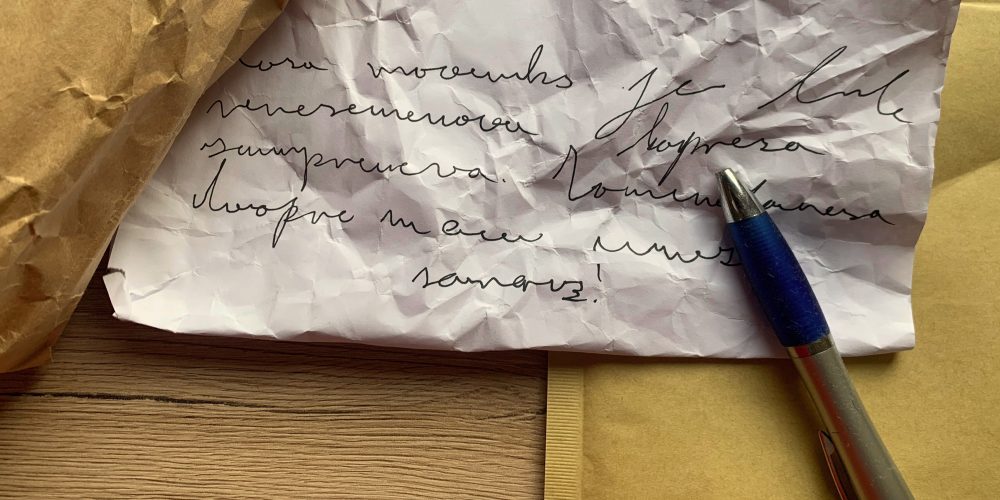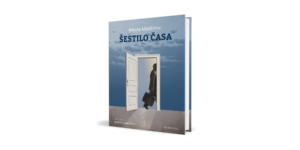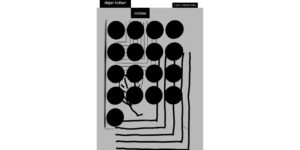Eva Ule: Preden se prepih zapre / Before receiving closure / Être en mesure de respirer
cvíliti -im nedov., cvilíla tudi cvílila (í) Prelistam/Prevrednotim/Prestrukturiram. Metafore so postale izrabljene kot koščice prezrelega sadja. Pretrgam/Pretresem/Prestanem. Spotaknem sintagmo, ker je smešno, ko se sesuje sama vase. Pregnetem/Preštejem/Prebodem. Zacvilim, ker je tišina kot brusilni papir na drugi strani pa neznosno piskanje, in nikjer ni več zatočišča papirja/vrednot/struktur/metafor. Zacvilim in to je vse, kar lahko naredim. crisser kʁi.se intransitif 1er groupe Replier/Réévaluer/Restructurer. Les métaphores sont épuisées comme des pépins de fruits surmûris. Retrancher/Renverser/Reposer. Subjuguer la syntagme, qui co-collapse comme un château de cartes. Remanier/Recenser/Réséquer. Crisser, car le silence gratte comme du papier de verre et ailleurs abominables sifflements, plus aucun refuge rempli du papier/valeurs/structures/métaphores. Crisser désespérément avant de résigner. wail intrans. verb ˈwāl wailed; wailing; wails Review/Reevaluate/Restructure. Metaphors are worn and spent like overripe peach pits. Rend/Reverse/Renounce. Subdue the syntagma to see its silly self-subsidence. Reshape/Reckon/Retaliate. Wail, for silence has sandpaper skin but the buzzing beneath is unbearable and long gone are homely havens of paper/values/structures/metaphors. Wail, and then give in – for it was all to no avail. Tišine Vse kar poznaš so moje tišine v pozibavanju listov papirja in vejic rastlin. Šklepetanje zob in kosti je kot kres te drobne samote: popelje me v razbrzdano krajino, kjer v nenehnem potrkavanju vztraja tiha simfonija in duet najine tišine. Silences Tu ne connais que mes silences dans le balancement des feuilles de papier et de brindilles de plantes. Le claquement des dents et des os est comme le feu de joie de cette minuscule solitude : il m'emmène vers une terre éclatée où dans un tapotement constant persistent la symphonie clandestine et le duo de notre silence. Silences All you've known are my silences in the rustling of sheets of paper and plant twigs. The rattling of teeth and bones seems to be the bonfire of this tiny solitude as it takes me to a frenzied landscape – where in a constant patter lingers the quiet symphony and the duet of our silence. *** Jutra se neutrudno polnijo v teži tvoje samote, ko se krpe razžirajo in se gozd spreminja v mlako in mlaka izhlapeva noč. Nikoli ne bomo dosegli narave ali začeli zeleniti po žalovanju, stegnili rok v svetlobo ali iznašli prave besede, ki bi povedala, kako zelo me je strah, da se bodo jutra nekoč nehala polniti in bo ostal le tvoj glasen šepet – kakor kamen, ki se zarašča v morje. *** Les matins se remplissent inlassablement dans le poids de ta solitude, pendant que torchons s'entre-corrodent, que la forêt se transforme en mare et que la mare fait évaporer la nuit. Nous n'atteindrons jamais la nature, ou de deuil commencerons à verdir, tendrons les bras vers la lumière ou inventerons la mots juste pour dire jusqu’à quel point j'ai peur qu'un jour les matins cessent de se remplir et seul ton murmure perçant demeure – comme une pierre qui s’amalgame dans la mer. *** Mornings fill tirelessly in the weight of your solitude, as the rags rot away and the woods melt into marsh and the pond disperses the night. Never will we reach nature or begin to grow green with grief, stretch our hands towards the light nor contrive the right words to convey just how awfully afraid I am that one day the mornings will no longer fill and your loud murmur alone will remain – like a pebble thawing into the sea. reka sanj smrdiš po asfaltu v katerem si se rodil tega ne pozabi ko prečkaš reko sanj rivière de rêves tu pues le bitume où tu es né ne l'oublie pas en franchissant la rivière des rêves. river of dreams you reek of the asphalt you were born in bear this in mind as you wade through the river of dreams. *** Koliko vode me mora preplaviti da si izruvam korenine in se prečlovečim? *** Jusqu'à quel point l'eau doit-elle m'inonder avant que je n'arrache mes racines et que je me transhumanise ? *** Just how much more water has to flood over me before I weed out my roots and rehumanize myself?
______________________________________________
O poeziji Eve Ule – med jeziki
Pričujoči cikel petih pesmi Eve Ule, Preden se prepih zapre, seveda predstavlja le majhen del njenega dosedanjega literarnega ustvarjanja, vendar kljub temu nazorno priča o razvoju avtoričinega pesniškega izraza, izoblikovanega skozi leta pisanja ter objavljanja besedil. Naklonjenosti do raziskovanja intimnih tematik in motivov narave, ki sta zanjo tako značilni, se vse izraziteje pridružujejo pomembna, zrela bivanjska vprašanja in refleksije, utrujeni resignaciji njenega lirskega subjekta pa odločno nasprotuje pesničina volja, celo težnja po manipulaciji jezika in besedni igri, predvsem spretnemu besedotvorju. Ta jezikovna radovednost ima posebej pomembno vlogo v njenih novejših delih, kjer morda dosega svojo najvišjo in najbolj prefinjeno točko, saj avtorica uspešno upogiba skladenjska, leksikalna in strukturna pravila, da bi preizkusila meje jezika in njegovih zmožnosti. Z vidika prevajanja je pri Evini poeziji morda najbolj zanimivo to, da način, kako manipulira z jezikom, zlasti besedotvorno, nazorno in prepričljivo ponazarja plastičnost in prožnost slovenskega jezika, s tem pa uspešno zagovarja slovenščino kot jezik pesniškega in literarnega raziskovanja. Svoji bogati, pomembni zgodovini in ugledni literarni dediščini navkljub niti angleščina niti francoščina pesniku ne dopuščata tolikšne ustvarjalne svobode; lahkotnost, s katero je mogoče v mejah slovenskega jezika zlagati, sestavljati in izpeljevati, je neprimerljiva. Četudi je kombinacija različnih besedotvornih tehnik ter drugih morfosintaktičnih trikov in orodij omogočila nastanek pričujočih prevodov, Evin pesniški cikel Preden se prepih zapre predvsem na ravni jezika, ne le semantike, opominja na omejitve literarnega prevajanja, na obstoj tistega dela poezije (še posebej sodobne), ki se v prevodu »izgubi«, ki je – prav zares – neprevedljiv. Zatorej kljub odprtemu dialogu z avtorico, ki je spremljal prevodni postopek, ter mojim lastnim po-ustvarjalnim prizadevanjem ostaja neprevedljivo v pesmih Eve Ule tako na voljo le tistim, ki imajo to srečo, da jih lahko preberejo tudi v izvirniku. The poetry of Eva Ule – between languages It goes without saying that Eva Ule’s five-poem cycle Before receiving closure represents only a small fraction of her literary production. However, it attests to the development of the author’s poetic expression through years of writing and publishing, as her penchant for themes of intimacy and nature motifs is accompanied with important, mature existential inquiries and reflections. The tired resignation of her lyrical subject is powerfully contrasted by the poet’s growing inclination for word manipulation and word play, as well as morphosyntactic innovation and word formation. This linguistic curiosity becomes especially abundant in her recent works and is now perhaps achieving its highest and most refined point as the author successfully bends syntactic, lexical and structural rules in order to test the limits of language and its abilities. What is perhaps most interesting about Eva’s poetry from the point of view of translation is that the way she manipulates language, especially when it comes to word formation, illustrates vividly and convincingly the malleability and flexibility of the Slovene language which proves its utmost suitability for poetry and literary exploration. Neither the English nor the French language allow for this much creative freedom despite the rich, important histories and (the well-deserved) high reputation of their respective literary heritages. The ease with which different morphological derivation and inflection techniques can be employed within the boundaries of the Slovene language is unmatched. While a combination of different word formation techniques and other morphosyntactic tools enable the emergence of the present translations, Eva’s poetry cycle Before receiving closure is a prime example of the limits of translation, especially when it comes to contemporary poetry. Despite an open translation dialogue with the author herself and my own best efforts, the untranslatable in Eva’s poems thus remains available only to those who are fortunate enough to be able to appreciate them in their original form.



